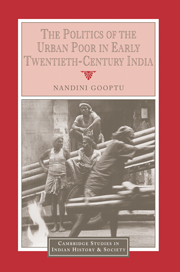Book contents
- Frontmatter
- Dedication
- Contents
- List of tables
- Acknowledgements
- List of abbreviations
- Select of glossary
- 1 The study and its perspectives
- Part I Changing contitions and experiences in interwar north India
- 2 The poor in the urban setting
- 3 Urban local policies and the poor
- 4 Urban policing and the poor
- Part II Modes of political action and perception
- Bibliography
- Index
4 - Urban policing and the poor
from Part I - Changing contitions and experiences in interwar north India
Published online by Cambridge University Press: 05 July 2014
- Frontmatter
- Dedication
- Contents
- List of tables
- Acknowledgements
- List of abbreviations
- Select of glossary
- 1 The study and its perspectives
- Part I Changing contitions and experiences in interwar north India
- 2 The poor in the urban setting
- 3 Urban local policies and the poor
- 4 Urban policing and the poor
- Part II Modes of political action and perception
- Bibliography
- Index
Summary
If urban local policies were increasingly geared to regulate the habitat and working environment of the poor in the interwar period, policing was to be directed at controlling their collective action and political behaviour in the public arena. While shifts in local policies often related to the fears about the lower orders in the minds of the propertied classes, policing additionally registered official preoccupation with the so-called ‘dangerous classes’. Until the early part of the century, the chief concern of urban policing to enforce and maintain public order was addressed through three key measures. These included a physical reconfiguration of the towns for greater and swifter mobility of arms and men, organisation of a centralised constabulary force, and the institution of a system of criminal justice and laws, which empowered the police to deal especially effectively with ‘offences’ that were seen to affect public order adversely. In the interwar period, the escalation of political unrest in the province led to significant reorientations in policing strategies. In particular, policing involved increasing armed intervention to curb or suppress political disturbances. The emerging policies to control political unrest and collective action were also crucially concerned with the poor. In official perception, even well before the interwar period, the urban lower classes were unruly, violent and the worst perpetrators of disorder. The Divisional Commissioner of Lucknow in 1907 was not untypical in pronouncing that the ‘poorer townspeople’ were ‘the most dangerous and easily excited class’.
- Type
- Chapter
- Information
- The Politics of the Urban Poor in Early Twentieth-Century India , pp. 111 - 140Publisher: Cambridge University PressPrint publication year: 2001



